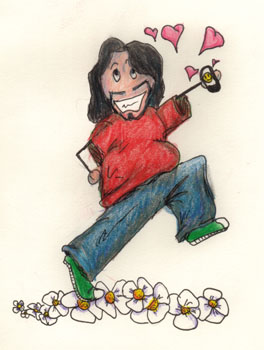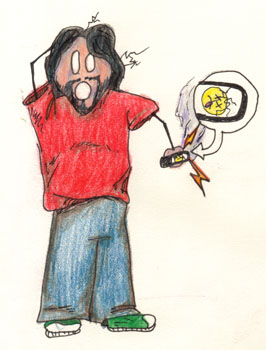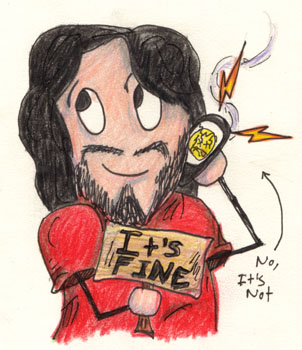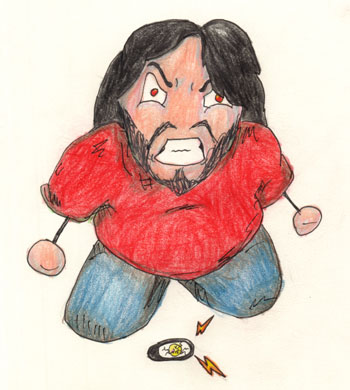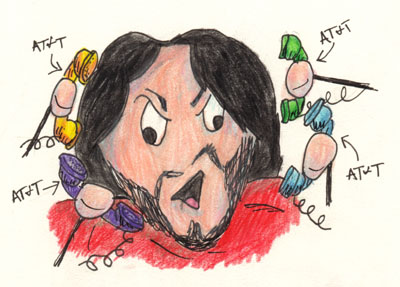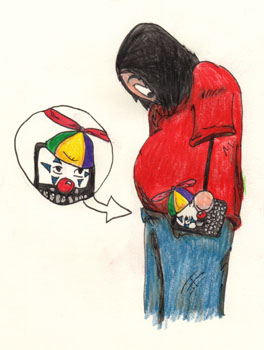The Death of a Pixi
“Should you shield the canyons from the windstorms you would never see the true beauty of their carvings.”
-Dr. Elisabeth Kübler-Ross
I usually weave the thrust of my articles within; today I’m right up front. There’s two points. This is first an examination of the Extended Grief Cycle, based on the work of Dr. Elisabeth Kübler-Ross, in a non-traditional way because the key to understanding grief is that the cause is not always a death but merely something we “perceive it as a significantly negative event.” I have worked with grief over the loss of jobs, homes, self-concepts, cars, childhoods—even one time a video game save. Grief has to do with a person’s ability to cope with a perceived loss. I believe we enter the Grief Cycle once any loss exceeds our base coping threshold. The second point is to poke a bit of fun at how much our society, myself first-and-fore, rely on our beloved techno-toys. Though this article has humorous aspects and presentation, I have not intended to make fun of anyone’s grieving except my own. If you would like help with your own grief, see the Helplinks page.
With that, I give you my own struggle with what I title “The Tragic, Unmerciful Death of My Dear Departed Cell Phone and Bosom Companion, Pixi.”
Stability
I was in a love affair with a Pixi Plus Smartphone by Palm. Yes, I know it’s not an iPhone. I like it better, call me a nutjob. I had specific needs when I bought this phone and paramount among them was a physical qwerty keyboard to provide my clumsy fingers the tactile feedback that I need to type on it with near the regularity of a keyboard. Much of the work you see on this site began on that phone. I wanted a laptop that I could keep in my pocket, I found it with the Pixi. Touch-screen, web surfing, music, videos, everything. I loved that little phone. Things were blissful. Things were stable.
Stability is the first stage identified by Swiss Dr. Elisabeth Kübler-Ross in On Death and Dying, her study of the emotional states which terminally ill patients moved through as they came to grips with their impending death. Since its publication in 1969 Dr. Kübler-Ross’s depiction of the Cycle of Grief has been applied to a multitude of loss situations in its original state or with slight additions, such as the model that I’m using here. Stability is the point before a loss when everything is normal.
Shock
I froze. I sat in the front seat of my car, winter hat perched on my head, ready to meet the cold and finish my Christmas shopping. But I couldn’t. I couldn’t do anything. My friend, my bosom companion, had a crack across her face. I swiped at it, but she gave only a blurred response, then…nothing. We were to shop together, tweeting and posting our holiday glee. She had my list of gifts. Now lost.
Shock is a stage that is added to in this model to indicate the moment in which everything seems to stop when first confronted with the loss. People can become “stuck” in any stage of the cycle and require time or therapy to move through them healthily. Catatonic, stunted, or emotionally distant people may have become stuck in the stage of shock.
Denial
It’s just dust, I thought. It didn’t move. A hair, a hair trapped under the screen protector. I scrabbled the screen free, but it was no hair. No, I thought. Not today. I have too much to do, too much to say. I pushed the reboot key, in the vain, irrational hope that if I could make a call then the phone would awaken to full functionality. No call. No function. No Pixi. She was gone, a fatal wound to the face.
Everyone goes through denial. I think part of the value in funerals is that all our loved ones come close during that time and confirm for us the reality of our loss, and help share its burden. Those stuck in the denial stage may still go on like everything’s the same. It is the hope that they are still processing the loss emotionally, just protecting their past mind or identity at the time.
Anger
I actually screamed. I did. Not proud, but true. My frustration that my phone was gone roared up from my gut and filled my car. It was short, but it wasn’t pretty.
Those stuck in anger may loudly vet their frustration or bottle it up. No matter the reaction, it must be noted that, to them, it’s like an alarm bell is ringing inside them, shouting “I’m not okay with this! It is unacceptable!” They are best to be treated with understanding and space. Never platitudes or placating.
Bargaining
I must have called AT&T six times to try and resolve the situation with a new Pixi. There was this whole issue with the insurance that I told the salesdude I wanted, and the insurance that I didn’t have. Back and forth with them, discussions with my wife about maybe I’m too clumsy for a touch screen all amounted to a “great deal” on a Blackberry Curve. “Is it a Smartphone?” I asked. “Oh, yes. With a trackball. It’s part of our upgrade plus, program.” The AT&T representative replied. There was no BWAHAHA. There should have been.
Bargaining can be a fast stage to move through. You ask the doctor, “Isn’t there anything we can do?” He replies, “No.” Bargaining with a higher power can last longer, as can bargaining with yourself over a loss that effects your self-perception. Ultimately, almost every bargaining stage ends with facing the inevitable, unavoidable, unbargainable loss.
Depression (Testing)
Look, Blackberry users. I’m sure you like your phones. Try a touch-screen Smartphone, please. The Pixi, the iPhone, the anything. The Curve is an ass of a Smartphone. It’s a great, clownish brick of a device. I heard calliope music every time I tried to navigate around the archaic interface with the track ball, which is nothing more than the goofy nose of the clown. I tried. I did. I downloaded app after app (all of which needed to be downloaded to my computer first and installed with a desktop program, How is that mobile?) but it was no use. This “upgrade plus” was nothing of the sort. I was frustrated, I was sad.
The depression that sets in is a good thing, as long as you don’t get stuck in depression. It shows that your body, mind and heart are slowing down, turning inward and using your energy to reconstruct your view of yourself, your world and life. Support a person in this stage. It would be detrimental to try and “cheer them up” and out of it before they are ready. This model also notes a Testing phase which was missing from the original Grief Cycle. My testing phase was with the Curve. Testing phases are all different but similar in that you are trying to re-engage with your new world. It is a sign of the successful end to depression and the return of your energy.
Acceptance
So, I bought a new Palm Pixi Plus. Of course I did. How could I not spend the extra cash to move from something that I hated to something that I love? But I, like the Pixi over the Curve, am smarter. I made sure that I have a receipt for the insurance and I bought a case. I have re-emerged into the world changed, wiser, and more focused on what is precious. In a cell phone sense.
Though this is a comic look at the Grief Cycle, and I know no one can buy a new loved one, the lesson can be very similar. Our losses teach us an appreciation for what we have, and those whom we are blessed with. I just found out this morning that my family has lost someone whom I found very dear, though I don’t think I showed him that enough. It is the simple irony of life that I had been working on this article for publication today. So, I dedicate it to him, such as it is. He was a funny and techno-savvy man, I trust he would get the point wrapped in the jokes. We’ll miss him. I wish we could just go and get a new body for him at the AT&T store. With the insurance.
K
“People are like stained-glass windows. They sparkle and shine when the sun is out, but when the darkness sets in, their true beauty is revealed only if there is a light from within.”
-Dr. Elisabeth Kübler-Ross


